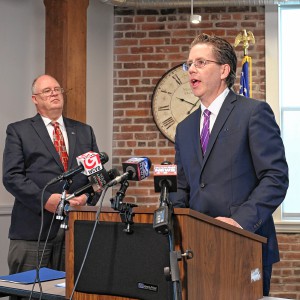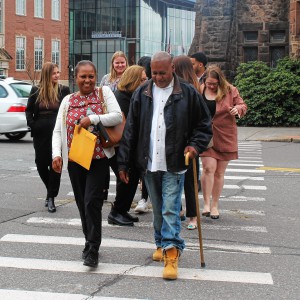My Turn: Can we start by permanently protecting more state land?
| Published: 04-24-2023 1:46 PM |
Gov. Maura Healey’s campaign promise for a moratorium for “commercial logging” on the 617,000 acres of state-owned forestland has gotten a lot of press coverage. It has generated a wide range of views on what the role of our forests should be in mitigating climate change, biodiversity loss, and the decline of public green spaces.
Is it possible to find a position that everyone can agree on? Probably not. But there are some things that we know for sure.
We know that scientists are saying that we need to greatly expand lands permanently protected from logging and other industrial uses — categorized as “GAP 1” or “GAP 2” by the U.S. Geological Survey. The Harvard Forest’s Wildland and Woodlands project calls for giving this protection to 10% of New England forests. The U.N. Convention on Biodiversity, which includes 195 countries, is urging that 30% of the planet be protected by 2030 (known as 30x30). The late world-renowned biologist, E.O. Wilson, contended that half the earth should be saved for nature.
We know that today, less than 2% of Massachusetts has this level of strong, permanent protection.
There are “reserve” areas on state lands that are largely protected from human management. We know these reserves, covering about 20% of our state-owned lands and 2.5% of the Massachusetts land base, are not permanently protected by law.
We know that laws governing state public lands don’t say how much or how often state lands will be logged. And our agencies don’t even call it logging any more. It’s “wildlife habitat improvement,” “even-aged management,” “ecological restoration,” and the like.
We know firsthand from collecting thousands of signatures from people across Massachusetts that most citizens don’t know that our state lands are logged, and they oppose this logging once they learn that it is happening.
We know that most people think it makes no sense that state land is being logged, burned, and sprayed with herbicides with the goals of “helping” wildlife, helping store carbon, or protecting water resources.
Article continues after...
Yesterday's Most Read Articles
 Greenfield homicide victim to be memorialized in Pittsfield
Greenfield homicide victim to be memorialized in Pittsfield
 1989 homicide victim found in Warwick ID’d through genetic testing, but some mysteries remain
1989 homicide victim found in Warwick ID’d through genetic testing, but some mysteries remain
 As I See It: Between Israel and Palestine: Which side should we be on, and why?
As I See It: Between Israel and Palestine: Which side should we be on, and why?
 Softball: Greenfield puts up 9-spot in the 8th inning to knock off rival Turners 11-2 in extra-inning thriller (PHOTOS)
Softball: Greenfield puts up 9-spot in the 8th inning to knock off rival Turners 11-2 in extra-inning thriller (PHOTOS)
 DA to announce breakthrough in 1989 unsolved homicide in Warwick
DA to announce breakthrough in 1989 unsolved homicide in Warwick
 Former Greenfield man granted new trial after 1995 murder conviction, walks free
Former Greenfield man granted new trial after 1995 murder conviction, walks free
We know that people want places of solace and renewal. Places like our national parks, where logging is not allowed.
We know all of this because we have been talking with scientists, environmentalists, agency officials, and policymakers. But even more important, we have been speaking with a multitude of members of the public of all ages, backgrounds and regions of the state.
We feel that most people agree that the vision of Henry David Thoreau is more important than ever — that wildness is the preservation of the world.
This simple and profound sentiment is what has led us to work to submit bills to the Legislature for three sessions running. What we are asking for is simple and straightforward. We know what is needed. Moratorium or not, we need more reserves on state-owned lands and to make them permanent by law.
This is very modest and highly reasonable action for the Legislature — or the governor — to take.
These lands are owned by the people of Massachusetts. We all have the right to speak out on their behalf. Please ask your legislator to co-sponsor our vital bills this session.
H904: An Act relative to increased protection of wildlife management areas ( Rep. Danillo Sena). And H894: An Act relative to forest management practices and guidelines ( Reps. Lindsay Sabadosa and Aaron Saunders). For more information visit www.savemassforests.com.
Janet Sinclair lives in Shelburne Falls. She co-founded Concerned Citizens of Franklin, which helped to defeat the biomass power plant proposed for Greenfield. She and Michael Kellett co-founded Save Massachusetts Forests to advocate for Massachusetts forest protection. Michael Kellett is executive director of Restore: The North Woods, based in Concord. His organization works to protect forests in New England and laid the groundwork for the establishment of 87,500-acre Katahdin Woods and Waters National Monument. The organization is working to expand national parks across the country.

 Guest columnist Gene Stamell: We know what we know
Guest columnist Gene Stamell: We know what we know Michelle Caruso: Questions candidate’s judgment after 1980s police training incident
Michelle Caruso: Questions candidate’s judgment after 1980s police training incident Kathy Sylvester: Vote for expertise on May 6
Kathy Sylvester: Vote for expertise on May 6 Shirley and Mike Majewski: Vote for Blake Gilmore
Shirley and Mike Majewski: Vote for Blake Gilmore
